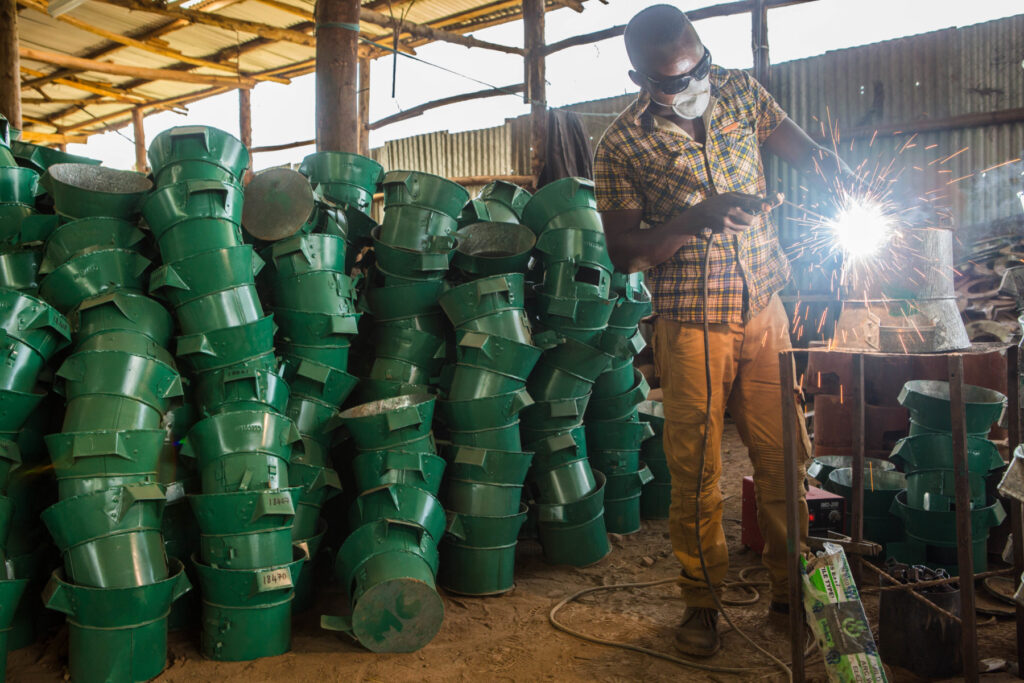Traditional cooking methods used in poor regions of the world can hugely damaging to the health of local communities and the environment. Improved cookstoves not only reduce carbon emissions, but also reduce wood consumption and local deforestation. By investing in offsetting projects that distribute cleaner cookstoves, organisations not only reduce and avoid greenhouse gas (GHG) emissions but also improve the lives of people living in rural communities in developing countries.
The poorest regions of the world are also those with limited access to energy, leading to a dependence on burning wood for heating, water purification and cooking. Many families use traditional cooking methods, placing three stones around an open fire, but unfortunately this has serious consequences for their health, their daily lives, and the environment.
The World Health Organisation estimates that smoke from traditional cookstoves is equivalent to smoking 2 packets of cigarettes a day. Communities using these stoves are exposed to toxic gases that cause severe respiratory problems. In Kenya alone, nearly 16,000 people die each year from air pollution and more than half are children.
On average, each household consumes between 5 and 12 kg of wood per day, a large but necessary quantity when using traditional cooking methods. This need for wood puts pressure on forests and increases deforestation. Furthermore, fetching wood is a time-consuming daily task that prevents many women and children from concentrating on other activities.
Compared to traditional cooking methods – i.e. “three-stone cooking” – improved cookstoves require about 50-60% less wood and so are more efficient, weigh less and are more sustainable.
There are several types of improved cookstoves, often made from ceramic or metal, that use either wood or charcoal.

Improved cookstove projects have taken on an important role globally in the sustainable development of the poorest and most climate-challenged areas. It is in this context that the Clean Cooking Alliance (CCA), an NGO created in 2010 and governed by the United Nations Foundation, works with a network of global partners to facilitate the development, manufacture and distribution of improved cookstoves.
Studies of improved cookstoves’ impact show that they not only reduce carbon emissions, but also reduce wood consumption and local deforestation. By being more wood-efficient and better designed, they also significantly improve indoor air quality, reducing rates of respiratory illnesses among women and children.
The time spent harvesting wood is also reduced, allowing women to spend time on other work activities and children to concentrate on their education. As their need for wood is reduced, so is the financial cost, allowing families to save money or use their resources to meet other needs.
This type of GHG reduction project that also improves people’s lives would not be possible without the funding provided through the voluntary carbon market.
The voluntary carbon market allows investors to buy carbon credits generated through offsetting and sequestration projects. What does this mean in practice?
A carbon credit is equivalent to one tonne of carbon avoided or reduced through a low-carbon project. In the case of improved cookstove projects, a carbon credit is generated when one tonne of carbon is avoided through reduced wood consumption. An improved cookstove can typically reduce between 1.5 and 4 tonnes of carbon per year per household.
EcoAct’s previous improved cookstove projects in Kenya and Sudan were very successful. We are now looking to build on the positive impact and benefits these projects had by expanding the programme to 20 African countries with the help of carbon finance. These decentralised solutions help alleviate poverty, reduce GHG emissions, and improve the resilience of local communities.
Since 2013, we have developed the Hifadhi-Livelihoods project in Kenya in partnership with the Livelihoods Fund and our subsidiary Climate Pal. Kenya has been hugely affected by deforestation with a loss of approximately 50,000 hectares of forest per year, i.e. the equivalent of 1.5 million hectares of land.
This project is certified by the Gold Standard, a label guaranteeing the robustness and monitoring of offsetting projects, and has two major objectives:
To ensure that the project is monitored, the Climate Pal team regularly visits the beneficiaries of the cookstoves to ensure that they are functioning properly. Since the implementation of the project, 60,000 improved cookstoves have been distributed in the Embu region during the first phase (Hifadhi-Livelihoods I) and 60,000 new cookstoves are currently being deployed for Hifadhi-Livelihoods II. In parallel, hundreds of jobs have been created directly or indirectly through the benefits of the project.
In the field, the teams in charge of distributing the stoves raise awareness within the local population about the challenges of sustainable development and the fight against climate change, the results of which they are experiencing head-on. As the demand for improved stoves grows, local artisans are also trained to make and repair them, thus creating new jobs to meet this demand.
Each improved cookstove beneficiary also receives 3 saplings: a fruit tree (avocado or mango), a wood tree, and a local tree with medicinal properties (such as moringa). These cookstove projects thus meet several Sustainable Development Goals, as defined by the UN: good health and well-being, gender equality, clean and affordable energy, measures to combat climate change, ensuring food security, etc.
Please contact us if you are interested in carbon offsetting and sequestration projects
To work towards net zero emissions, offsetting mechanisms complement significant emission reduction actions, please read our “A to Zero” guide.
EcoAct’s ACTR approach helps organisations navigate the complexities and obstacles of transitioning to net-zero, leverage the opportunities from the business transformation process, while building resilience, protecting nature, and actively contributing to the regeneration of our environment.
Part of our service to you is to share the latest industry news, expert thought-pieces, and informative publications.
Join thousands of subscribers and get the latest insights straight to your inbox.